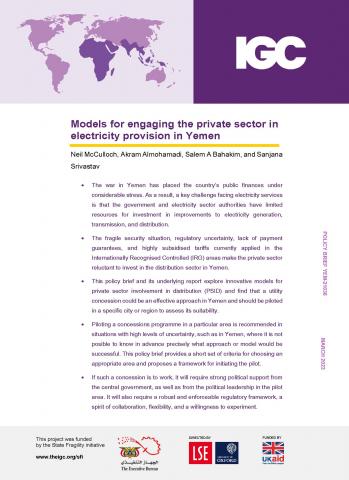Models for engaging the private sector in electricity provision in Yemen (Policy brief)
This policy brief explores innovative models for private sector involvement in distribution (PSID) and find that a utility concession could be an effective approach in Yemen and should be piloted in a specific city or region to assess its suitability.
-
McCulloch et al Policy brief March 2023
PDF document • 296.19 KB
- The war in Yemen has placed the country’s public finances under considerable stress. As a result, a key challenge facing electricity services is that the government and electricity sector authorities have limited resources for investment in improvements to electricity generation, transmission, and distribution.
- The fragile security situation, regulatory uncertainty, lack of payment guarantees, and highly subsidised tariffs currently applied in the Internationally Recognised Controlled (IRG) areas make the private sector reluctant to invest in the distribution sector in Yemen.
- This policy brief and its underlying report explore innovative models for private sector involvement in distribution (PSID) and find that a utility concession could be an effective approach in Yemen and should be piloted in a specific city or region to assess its suitability.
- Piloting a concessions programme in a particular area is recommended in situations with high levels of uncertainty, such as in Yemen, where it is not posible to know in advance precisely what approach or model would be successful. This policy brief provides a short set of criteria for choosing an appropriate area and proposes a framework for initiating the pilot.




